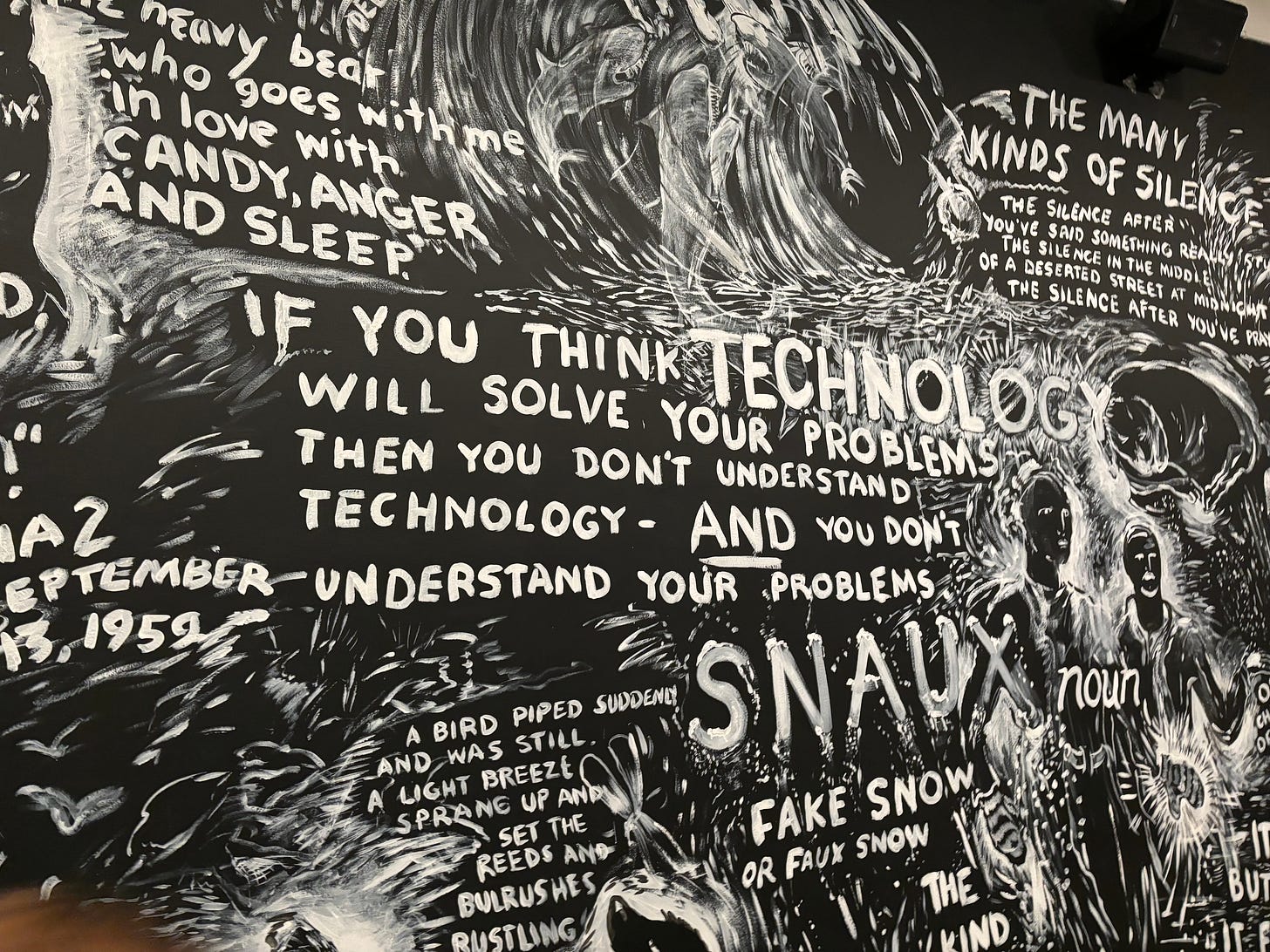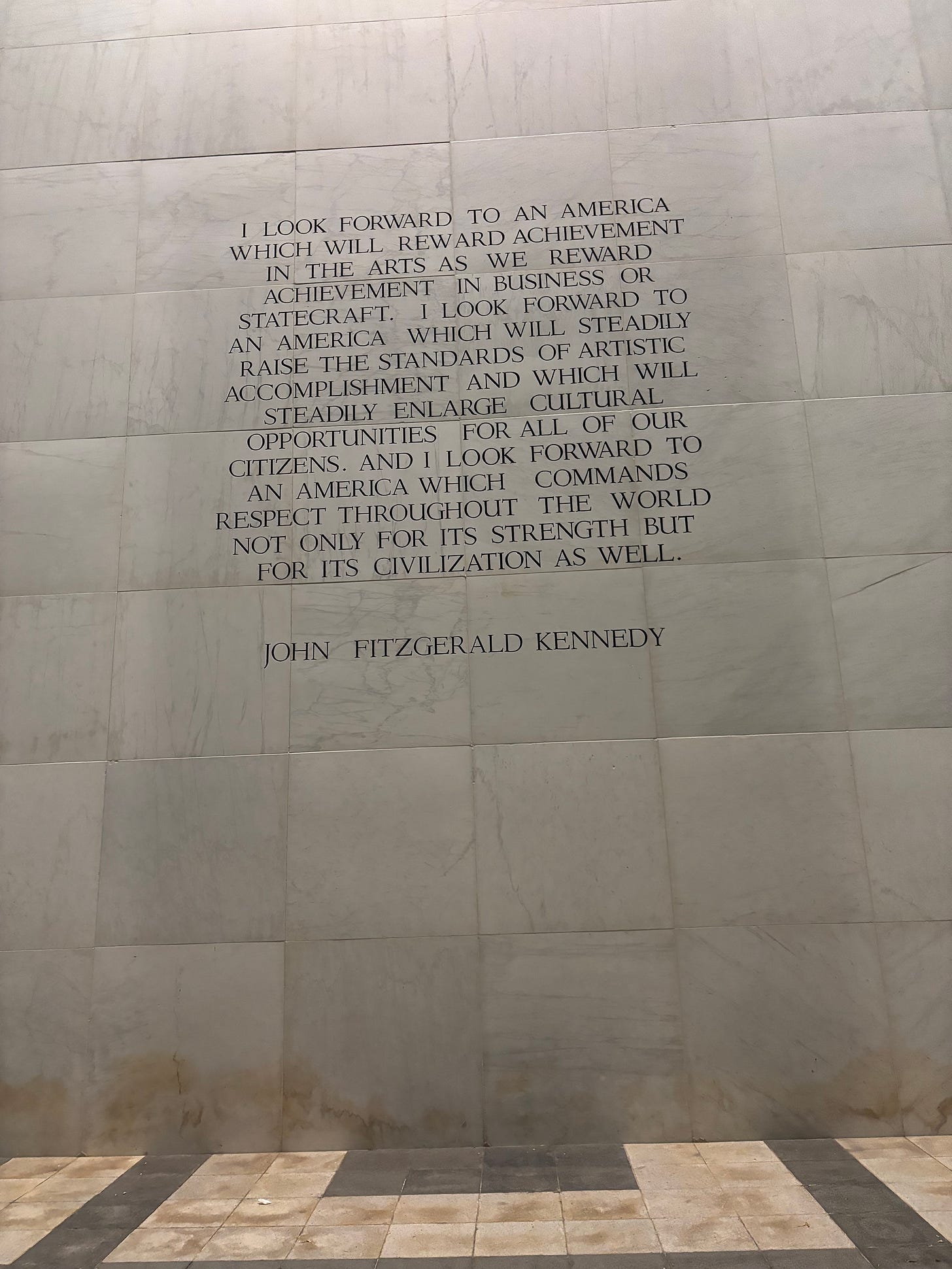Why Do Our Leaders Speak So Poorly?
A visit to Washington, D.C. reminds us of a bygone era for statecraft.
Washington, D.C. is a town full of quotations on display. There are so many monuments to leaders, soldiers and explorers and all of them feature samples of rhetoric meant to explain, delight and expire.
At the Smithsonian’s Hirshhorn National Museum of Modern Art right now there are three text-based installations on view, from Barbara Krueger (“Belief+Doubt”), Jessica Diamond (“Wheel of Life”) and Laurie Anderson (“Four Talks”). The Anderson exhibit, which also features her sculptures, is especially thought provoking, particularly this piece of text: “If you think technology will solve your problems then you don’t understand technology - and you don’t understand your problems.”
The night before our museum exhibit, we went to the John F. Kennedy Center for the Performing Arts, which features several inscribed quotations from the former president. The Middlebrow is no Boomer and has limited affection for JFK. I imagine, were I alive at the time, I’d have held him responsible for the unnecessary war in Vietnam, the poverty in America’s cities and the racism of the government’s efforts to quell a growing crime wave. But, consider this, from one of the Kennedy Center’s stone walls:
“I look forward to an America which will not be afraid of grace and beauty…an America which will reward achievement in the arts as we reward achievement in business or statecraft. I look forward to an America which will steadily raise the standards of artistic accomplishment and which will steadily enlarge cultural opportunities for all of our citizens. And I look forward to an America which commands respect throughout the world not only for its strength but for its civilization as well.”
The Scholar Wife quickly remarked, “Can you imagine a modern president saying anything like that?” She’s not particularly taken by JFK as a man, leader or orator either, but none of the presidents from our lifetimes have multipurpose art centers named for them, much less anything relevant to say about art and culture. It’s simply not part of our contemporary political discourse.
Kennedy said those words while accepting an honorary degree from Amherst College in 1963. In the post World War II years, the U.S. government actually believed in trying to win a global cultural conversation and so the government, including through the Central Intelligence Agency but also in more overt ways, invested in the arts. The rise of American literature, music, performing and visual arts was seen as vital and important. Leaders spoke about creative achievement the way they speak about superiority in building computer processors today.
Forget what you think about Donald Trump or Joe Biden. Would they ever debate about artistic achievement? Do either of them read books not written by their ghostwriters or the ghostwriters hired by their friends?
Barack Obama, who nows has a film production company, told Axios recently that he “mostly watches sports.” There’s nothing wrong with that, but it would be nice to imagine that a former president who has taken on the role of producing narrative fiction for streaming services might also read a novel every now and then. Ronald Reagan even read fiction. He’s why The Hunt for Red October became a hit in the 1980s. Does anybody know, at least, if George W. Bush still paints pictures of himself in the bathtub?
The big change, over the decades, is that our leaders used to not only appreciate the arts but would model their consumption for the people, as if to remind people that enjoying and celebrating artistic achievement is part of a life well lived. Now, after decades of culture wars, our leaders are afraid to seem effete or out of touch. they have signaled to the country that regular people don’t watch dance performances, attend the symphony or sit through an opera. We’re meant to be a nation of Homer Simpsons even though, whenever the well-educated writing staff of The Simpsons has Homer experience the finer things, he comes out a little better for it.
Now, more than ever, as our computers mimic and devalue creative processes, we need leaders who can speak to the value of human accomplishment on stage, page, canvas or stone. When the market might fail to appreciate or value what we make, we need to step in. Our leaders have embraced philistinism and we haven’t grappled with the consequences of that at all.
Let’s let JFK have the closing remarks:




